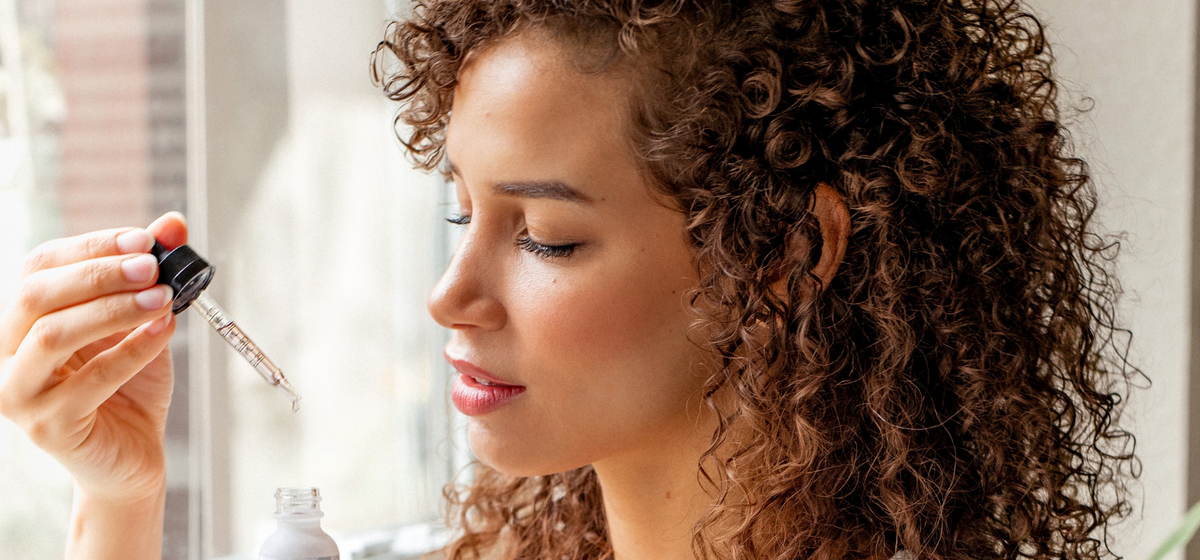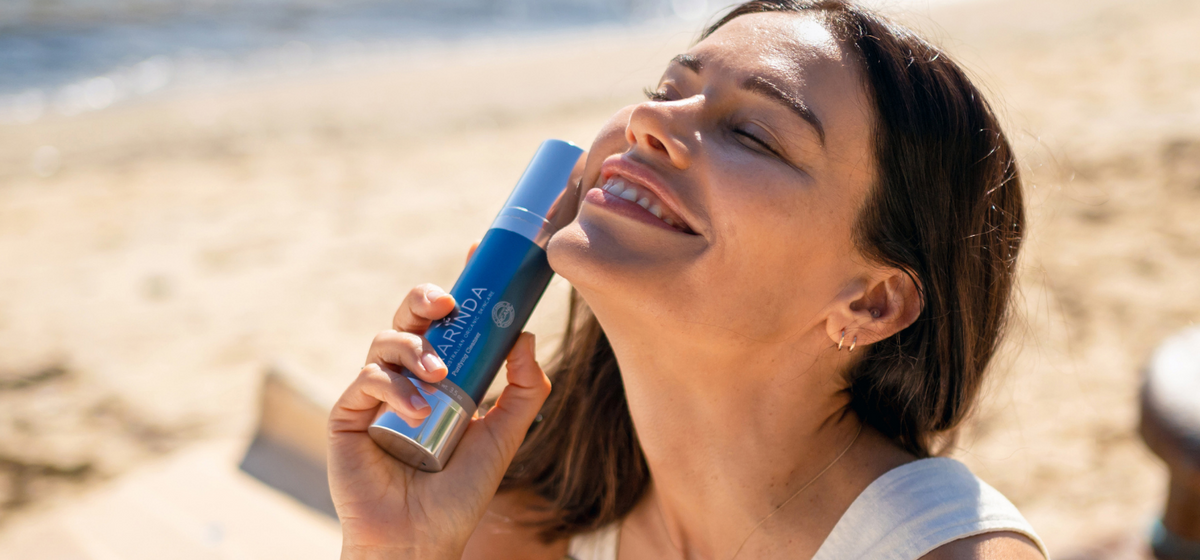Why Your Skin Barrier Is The Secret To Healthy Skin

Inflammation, dryness, dehydration, and irritation can all be signs of a damaged skin barrier. We explain its crucial role in a healthy complexion, how it gets damaged and the best ingredients to restore a damaged skin barrier.
What is the skin barrier?
Your skin barrier is the outer layer of the epidermis (top layer of skin) known as the stratum corneum.
Your skin barrier has 2 key functions - to lock moisture into the skin and keep external irritants and pathogens (bad bacteria) out!
What is your skin barrier made of?
The skin barrier is made up of dead skin cells, lipids (fats), natural moisturising factors, and amino acids. They all work together to create a protective film that keeps skin hydrated and strong against external aggressors.
A damaged skin barrier
Your skin barrier becomes damaged when it’s stripped of the oils and moisture it needs to function at its best. When this happens, the protective barrier begins to ‘crack’ which results in:
- Increased moisture loss. Water evaporates more rapidly off the surface through the cracks leaving skin dry and dehydrated.
- Increased reactivity and inflammation. The cracks make the skin vulnerable to the assaults of external irritants and bacteria.
Signs your skin barrier is damaged include:
- Red, blotchy skin
- Increased sensitivity. Having reactions to skincare products you previously had no problem with
- Stinging or burning sensations - especially when applying skincare
- Dry flaky, skin (dryness)
- A tight, itchy feeling (dehydration)
- Breakouts
- Roughness
- Triggering or exacerbating inflammatory skin conditions such as eczema and rosacea
Causes of skin barrier damage
Any number of factors ranging from your skincare to environmental factors can cause your skin barrier to become compromised.
Over cleansing, over-exfoliation, and using the wrong skincare products
Cleansing your skin too often, using products not suited to your skin type/ concerns and over exfoliating are some of the most common causes of a damaged skin barrier.
Essentially, these things strip the skin of the natural oils and moisturising factors it needs to stay healthy.
Cleansers: Avoid any that leave your skin feeling dry and tight afterwards. Usually, these are ‘foaming’ cleansing products that contain harsh chemicals like Sodium Lauryl Sulfate.
Go easy on Alpha Hydroxy Acids (AHAs): While acids have a place, not all skin types can handle them - especially salicylic acid. Even if you choose a gentler acid, overusing it will still cause damage.
Rough, grainy exfoliators: Steer clear of physical exfoliators with extremely coarse ingredients like crushed nuts. These are usually far too abrasive for the skin and can cause micro tears.
Also avoid cleansing with hot water, which strips the barrier of oils and moisture.
UV rays
Yet another excellent reason to wear sunscreen Every. Single. Day.
Your skin barrier is your body’s first line of defense against solar UV radiation. Research tells us that overexposure to UV rays can compromise the barrier leading to extreme skin damage such as chapping and cracking.
Not getting enough sleep and stress
Constant stress and exhaustion spell bad news for your skin barrier.
Getting enough sleep is incredibly important to give your skin time to rejuvenate and repair itself. Research shows missing out on quality sleep can impair the function of your skin barrier.
As for stress, many studies have established the negative effects on skin - including the integrity of the skin barrier - when high amounts of the stress hormone (cortisol) are constantly released into the body.
Ageing and genetics
Some people are predisposed to a weaker skin barrier due to genetics. Inflammatory skin conditions like rosacea, eczema and psoriasis or sensitive and dry skin types are often a result of genetics.
As we age, our skin becomes thinner and more susceptible to damage, recovering at a slower rate than it did when we were younger.
Topical and oral medication
Some medications may also disrupt a healthy skin barrier function. The side effects of strong acne medication designed to dry out the skin, like accutane, can result in a more fragile skin barrier.
How can you heal your skin barrier?
The most practical approach to address redness, skin-sensitivity, inflammation, and dehydration is to rebuild your skin routine. You want to work on restoring barrier strength, add moisture and calm irritation. The following ingredients will be a welcome relief for an irritated, dry, weak skin barrier.
Fatty acids
Fatty acids are an essential part of your skin's natural oil matrix and oleic, palmitic, and linoleic fatty acids, in particular, are very beneficial for skin. Using products containing these fatty acids restore and replenish a damaged barrier.
Many plant-based are packed with fatty acids:
Sunflower Seed Oil
Brimming with fatty acids (linoleic, oleic and palmitic acids) Sunflower seed oil can accelerate skin barrier healing and promote hydration.
Jojoba Oil
A good source of several fatty acids, jojoba is a lightweight oil readily accepted by the skin and suitable for even the most sensitive skin types.
Sandalwood Seed Oil
With an uplifting fragrance and incredible skin healing properties, sandalwood seed oil is rich in ximenynic acid. A rare fatty acid, ximenynic acid is known to reduce fine lines, improve skin tone, hydration and increase derma strength
Camellia Seed Oil
Packed with omega-9 fatty acids, antioxidants, polyphenols, vitamin E, and proteins it promotes skin elasticity and hydration helping keep skin supple and hydrated.
Ceramides
Ceramides are made up of long-chain fatty acids that lock moisture into the skin by creating a barrier that minimises water loss. Ceramides help to address dehydration, dryness, and irritation.
Tocopheryl (natural Vitamin E)
Tocopheryl is a specific type of vitamin E with skin soothing and moisturising benefits.
With healing, moisturising and anti-inflammatory benefits, vitamin E is ideal to calm and repair dryness and irritation associated with a compromised barrier function and help rebuild the lipid barrier.
Hydrating ingredients
Sodium Hyaluronate
A humectant ingredient, sodium hyaluronate works to attract moisture to the skin’s surface. An excellent hydrating ingredient, it offers thirsty, parched cells moisture relief and promotes a healthy barrier function.
Get back to basics with Karinda: 3 steps to healing your skin barrier
Keep your skin care routine simple. One of the reasons the skin barrier becomes damaged in the first place is over use of products - skin is simply overwhelmed by ingredients.
While nourishing your barrier back to health, we recommend using our Purifying Cleanser, Nourishing Moisturiser, plus a mineral sunscreen to begin with.
Then you can introduce our Sacred Youth Oil into your routine (following the Nourishing Moisturiser) for an extra boost of support with fatty-acid rich plant oils.
Once your skin is back to a healthy, happy state, you can reintroduce skincare products with stronger active ingredients. Just don’t go overboard or you’ll be back at square one!
Leave a comment
Comments will be approved before showing up.
Also in News

3 Big Skincare Mistakes You Don't Want To Make

Active Ingredient Percentages: What You Need to Know


